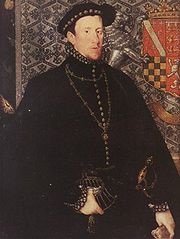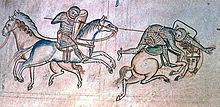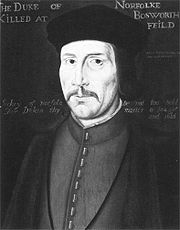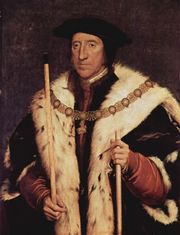- Earl Marshal
-
Das Amt des Earl Marshal ist ein mittelalterlicher Titel des Ritterstands in England, Irland, Schottland und später im Vereinigten Königreich.
Inhaltsverzeichnis
England
 Earl Marshal Thomas Howard, 4. Duke of Norfolk
Earl Marshal Thomas Howard, 4. Duke of Norfolk
Der Earl Marshal of England ist ein erblicher Titel eines hohen englischen Staatsbeamten. Zunächst lautete der Titel nur Marshal, bis unter William Marshal, 1. Earl of Pembroke, dessen Name die beiden Bestandteile Earl und Marshal noch getrennt enthielt, die Bezeichnung Earl Marshal geläufig wurde. Nachdem das Amt an die Familie der Dukes of Norfolk gekommen war, wurde Earl Marshal die offizielle Bezeichnung. Der Earl Marshal ist der achte unter den Great Officers of State mit dem Lord High Constable über ihm und nur dem Lord High Admiral unter ihm. Das Amt wurde wie einige andere unter den Great Officers of State auch von mehreren Personen in Kommission ausgeübt.
Im Mittelalter waren der Earl Marshal und der Lord High Constable die für die Pferde und Stallungen des Königs verantwortlichen Offiziere. Als Ritterstand und Adel an Einfluss gewannen, nahm die Bedeutung des Lord High Constable ab und der Earl Marshal wurde Leiter des College of Arms (Heroldsamt), das mit allen Angelegenheiten der Genealogie und Heraldik befasst war. In Verbindung mit dem Lord High Constable saß er dem Court of Chivalry vor, einem Gericht, das sich Fragen nach der Höhe des Lösegelds, der Aufteilung der Beute, der Besoldung von Soldaten und schließlich dem Missbrauch von Wappen beschäftigte. Als einer der Groß-Offiziere ist er auch heute noch mitverantwortlich für Krönungszeremonien und Parlamentseröffnungen.
Nach dem House of Lords Act 1999 ist der Earl Marshal neben dem Lord Great Chamberlain der einzige Träger eines erblichen Adelstitels, der automatisch einen Sitz im Oberhaus hat, damit er seine zeremoniellen Aufgaben im House of Lords erfüllen kann.
Lords Marshal von England 1135-1397
 William Marshal, 1. Earl of Pembroke, Namenspatron für den Earl Marshal
William Marshal, 1. Earl of Pembroke, Namenspatron für den Earl Marshal
- Gilbert de Clare, 1. Earl of Pembroke 1135-1149
- Richard de Clare, 2. Earl of Pembroke 1149-1176
- John Marshal 1176-1199
- William Marshal, 1. Earl of Pembroke 1199-1219
- William Marshal, 2. Earl of Pembroke 1219-1231
- Richard Marshal, 3. Earl of Pembroke 1231-1234
- Gilbert Marshal, 4. Earl of Pembroke 1234-1242
- Walter Marshal, 5. Earl of Pembroke 1242-1245
- Anselm Marshal, 6. Earl of Pembroke 1245
- Roger Bigod, 4. Earl of Norfolk 1245-1269
- Roger Bigod, 5. Earl of Norfolk 1269-1307
- Robert de Clifford, 1. Baron de Clifford 1307-1308
- Nicholas Segrave, Baron of Stowe 1308-1315
- Thomas of Brotherton, Earl of Norfolk 1315-1338
- Margaret, Herzogin von Norfolk 1338-1377
- Henry Percy, Lord Percy 1377
- John FitzAlan, 1. Baron Arundel, Lord Maltravers 1377-1383
- Thomas Mowbray, 1. Earl of Nottingham 1383-1397
Earls Marshal von England 1397-heute
 Earl Marshal John Howard, 1. Duke of Norfolk
Earl Marshal John Howard, 1. Duke of Norfolk
 Earl Marshal Thomas Howard, 3. Duke of Norfolk
Earl Marshal Thomas Howard, 3. Duke of Norfolk
- Thomas Mowbray, 1. Duke of Norfolk 1397-1398
- Thomas Holland, Duke of Surrey 1398-1399
- Ralph Neville, 1. Earl of Westmorland 1400-1412
- John Mowbray, 2. Duke of Norfolk 1412-1432
- John Mowbray, 3. Duke of Norfolk 1432-1461
- John Mowbray, 4. Duke of Norfolk 1461-1476
- Richard Plantagenet, 3. Duke of York 1476-1483
- John Howard, 1. Duke of Norfolk 1483-1485
- William Berkeley, 1. Earl of Nottingham 1486-1497
- Henry Tudor, Duke of York 1497-1509
- Thomas Howard, 2. Duke of Norfolk 1509-1524
- Thomas Howard, 3. Duke of Norfolk 1524-1547
- Edward Seymour, 1. Duke of Somerset 1547-1549
- John Dudley, 1. Duke of Northumberland 1549-1553
- Thomas Howard, 3. Duke of Norfolk 1553-1554
- Thomas Howard, 4. Duke of Norfolk 1554-1572
- George Talbot, 6. Earl of Shrewsbury 1572-1590
- in Kommission 1590-1597
- Robert Devereux, 2. Earl of Essex 1597-1601
- in Kommission 1602-1603
- Edward Somerset, 4. Earl of Worcester 1603
- in Kommission 1604-1622
- Thomas Howard, 21. Earl of Arundel 1622-1646
- Henry Howard, 22. Earl of Arundel 1646-1652
- in Kommission 1652-1661
- James Howard, 3. Earl of Suffolk 1661-1662
- in Kommission 1662-1672
- Henry Howard, 6. Duke of Norfolk 1672-1684
- Henry Howard, 7. Duke of Norfolk 1684-1701
- Thomas Howard, 8. Duke of Norfolk 1701-1732
- Edward Howard, 9. Duke of Norfolk 1732-1777
- Charles Howard, 10. Duke of Norfolk 1777-1786
- Charles Howard, 11. Duke of Norfolk 1786-1815
- Bernard Edward Howard, 12. Duke of Norfolk 1815-1842
- Henry Charles Howard, 13. Duke of Norfolk 1842-1856
- Henry Granville Fitzalan-Howard, 14. Duke of Norfolk 1856-1860
- Henry Fitzalan-Howard, 15. Duke of Norfolk 1860-1917
- Bernard Marmaduke Fitzalan-Howard, 16. Duke of Norfolk 1917-1975
- Miles Stapleton-Fitzalan-Howard, 17. Duke of Norfolk 1975-2002
- Edward William Fitzalan-Howard, 18. Duke of Norfolk 2002-
Weblinks
Lord High Steward | Lord High Chancellor | Lord High Treasurer | Lord President of the Council | Lord Keeper of the Privy Seal | Lord Great Chamberlain | Lord High Constable | Earl Marshal | Lord High Admiral
Wikimedia Foundation.
Schlagen Sie auch in anderen Wörterbüchern nach:
Earl Marshal — Arms of Her Majesty s Government … Wikipedia
Earl Marshal — n. a high officer of state in England, marshal of state ceremonies and head of the Heralds College * * * … Universalium
Earl Marshal — n. a high officer of state in England, marshal of state ceremonies and head of the Heralds College … English World dictionary
Earl marshal — Earl mar shal An officer of state in England who marshals and orders all great ceremonials, takes cognizance of matters relating to honor, arms, and pedigree, and directs the proclamation of peace and war. The court of chivalry was formerly under … The Collaborative International Dictionary of English
earl marshal — The eighth great officer of state in England. At one time the earl marshal presided over the court of chivalry when it was held as a military court, or court of honor and when this court was held as a criminal court, it was presided over by the… … Ballentine's law dictionary
Earl marshal of England — Marshal Mar shal, n. [OE. mareschal, OF. mareschal, F. mar[ e]chal, LL. mariscalcus, from OHG. marah scalc (G. marschall); marah horse + scalc servant (akin to AS. scealc, Goth. skalks). F. mar[ e]chal signifies, a marshal, and a farrier. See… … The Collaborative International Dictionary of English
Earl marshal of Scotland — Marshal Mar shal, n. [OE. mareschal, OF. mareschal, F. mar[ e]chal, LL. mariscalcus, from OHG. marah scalc (G. marschall); marah horse + scalc servant (akin to AS. scealc, Goth. skalks). F. mar[ e]chal signifies, a marshal, and a farrier. See… … The Collaborative International Dictionary of English
Earl Marshal, Court of the — The Court of the Earl Marshal of England was by the 14c a court with jurisdiction over a wide range of military matters, such as discipline in the army, treason, also prisoners of war and disputed heraldic arms. What remains is the jurisdiction… … Dictionary of Medieval Terms and Phrases
earl marshal's court — noun Usage: usually capitalized E&M, often capitalized C : the English court of chivalry since the time when it has been held before the earl marshal alone called also Marshal s court; compare court of the constable and marshal … Useful english dictionary
earl marshal — noun Date: 13th century an officer of state in England serving chiefly as a royal attendant on ceremonial occasions, as marshal of state processions, and as head of the College of Arms … New Collegiate Dictionary
